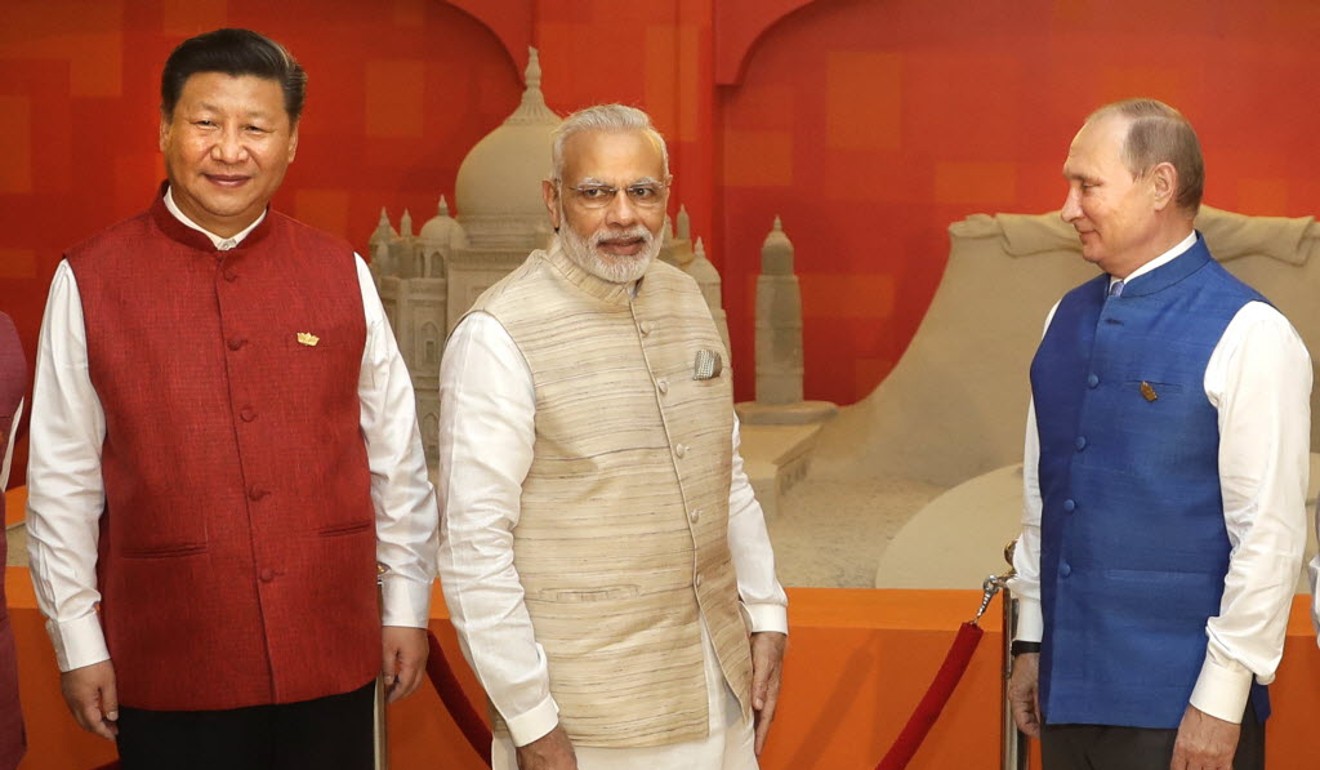
China-India border dispute could hurt summit of five emerging economies, analysts warn
Containing the rift between Beijing and New Delhi is vital in maintaining unity within the five-member bloc
The stand-off between China and India in a disputed border area could overshadow the aims of the upcoming BRICS summit to boost economic growth and promote the status of emerging powers on the world stage, analysts said.
The two nations have been engaged in a dispute in the Dokalam area of the India-Bhutan-China tri-junction for over three weeks, after the Chinese military began work on a road construction project there.
China is set to host the ninth BRICS summit in the southeastern coastal city of Xiamen in September. But whether or not Beijing and New Delhi can contain the escalating crisis and maintain the unity of the bloc has yet to be seen, according to experts from the two sides.
“The level of uncertainty is increasing,” said Pang Zhongying, a senior fellow at the Ocean University of China in Qingdao, Shandong province.
The recent conflict reflects the deep-seated strategic mistrust between the two countries, and “if the stand-off escalates or worsens, it might spill over into the BRICS summit and affect the effectuality of the group in shaping a new global order”, he said.

The dispute has already had an impact on trade talks on farm products between the two countries. China recently deferred making a decision on whether to grant market access to Indian rice, beef, okra and pomegranates, while India opted to continue with its ban on imports of apples, pears, milk and dairy products from China, The Hindu reported on Thursday quoting government sources.
BRICS is an association of the world’s five major emerging economies – Brazil, Russia, India, China and South Africa – that was fully formed with the induction of South Africa in 2010.
Branded as a major platform to demonstrate the influence of rising powers, the group represents about 40 per cent of the global population and since the end of 2009 has accounted for about 50 per cent of global growth.
Manoranjan Mohanty, former chairperson of the New Delhi-based Institute of Chinese Studies, said that conflict between India and China presents a challenge for BRICS as a whole. Brazil, Russia and South Africa each have close ties with their two co-members, so a dispute between China and India must not be allowed to “derail the multilateral deliberations”, he said.

“In the light of Brexit and Trump’s assertions, the Xiamen summit should be a new phase for BRICS in taking the initiative on global governance,” Mohanty said.
“If the leaders do not seize that opportunity they will be failing their historic mandate.”
As a sign of goodwill amid the crisis in Dokalam, Chinese President Xi Jinping and Indian Prime Minister Narendra Modi met informally last week on the sidelines of the G20 summit in Hamburg. Modi took the opportunity to acknowledge the momentum BRICS had achieved under China’s chairmanship this year.
Indian Foreign Secretary S Jaishankar said last week in Singapore that India and China had always managed to handle their border disputes in the past, so there was no reason why they would not be
able to do so this time.
But on Wednesday, Beijing continued its hardline stance on the dispute, with foreign ministry spokesman Geng Shuang calling for Indian troops to retreat “without condition, immediately” from the area to resolve the issue “as soon as possible”.
Indian National Security Advisor Ajit Doval is expected to visit China on July 26-27 for the BRICS national security advisers’ meeting hosted by his counterpart, Chinese State Councillor Yang Jiechi, The Indian Express reported, citing government sources. The two men are also special representatives designated by their governments to discuss border issues, the report said.
Sun Shihai, a researcher on South Asian studies at the Chinese Academy of Social Sciences, said that the upcoming BRICS summit might provide an opportunity for Xi and Modi to discuss the establishment of a road map for resolving future disputes.
Rajeev Ranjan Chaturvedy, a research associate with National University of Singapore, said that the ongoing official communication between the two countries, as well as the continuation of all BRICS-related business – including ministerial meetings – indicate that Beijing and New Delhi are able to contain the crisis.
“Both countries are working through back channel diplomacy and established institutional mechanisms to iron out the differences,” he said.
However, the border conflict should not be allowed to overshadow the main focus points of the BRICS summit, including “climate change, counterterrorism, financial inclusion, and cooperation in the fields of space, cybersecurity, research and innovation”, he said.

